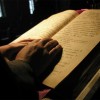All Orthodox Christians are aware of the importance of prayer, fasting, and almsgiving, in our journey to God. These three practices are at the heart of the Great Lenten Fast. Prayer is our way of communicating with God on a daily basis, and fasting days (Wednesday and Friday) are called for throughout the Church Year. As Christians, we are also obligated to give alms to the poor, as demonstrated throughout the New Testament. Yet we often overlook the great spiritual practice of entering into the Silence as a way to discover ourselves, and deepen our experience with God’s presence.
Today’s technological advancements have introduced noise into our lives in ways unthinkable to the ancients. Not more than a hundred years ago, most families found silence as an everyday experience, for when the sun went down, families nestled into warm corners of their parlors, and their kitchens, often reading books, or simply watching a crackling fire. Along with this quieting down of the day, silence was part of every evening.
Orthodox families were especially cognisant of the need to spend quiet time on the eve of the Sunday Liturgy, as well as great feasts of the Church, knowing that this silence served as a preparation time for receiving Christ’s Body and Blood, during the celebration of the upcoming Liturgy.
Keeping silence by turning off radios and television sets, muting iPods, and turning off computers, is a splendid way of allowing everyone in the family to experience the silence that allows us to listen for the voice of God, speaking in our hearts. Refraining from conversation, music, and all forms of entertainment for just an hour or two, helps open us to an experience of God that has become foreign to most modern Americans.
Silence is the means by which we may access and deepen our relationship with God, and develop self-knowledge. Silence allows us to live more harmoniously in our world, and actually listen for the voice of God speaking to our hearts. Saint Theophilus, Patriarch of Alexandria, placed the virtue of silence on par with the faith itself in a synodal letter from AD 400. “Monks—if they wish to be what they are called—will love silence and the catholic faith, for nothing at all is more important than these two things.” This invitation into the silence is not for monks only.
With love in Christ,
Abbot Tryphon

















